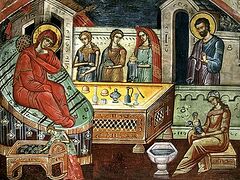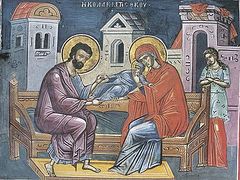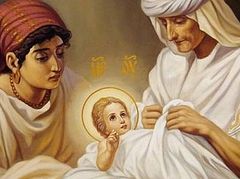Jacob made haste. Fleeing from the wrath of his brother Esau, he hurriedly walked along the rocky paths, casting his gaze down to the lands once promised to his grandfather Abraham. Exhausted from his hurried journey, Jacob settled down for a short rest, leaned his head on a stone, and soon fell asleep.
And then he saw in a dream: a ladder, fixed on earth, reaching up to Heaven itself. The angels of God were ascending and descending upon it, and at the top—the Lord Himself. And Jacob heard from Him the pleasant, comforting words: In thy seed shall all the families of the earth be blessed. And, behold, I am with thee (Gen. 28:14-15).
When he woke up, delighted by what he had seen and heard, Jacob somewhat naively says: Surely the LORD is in this place; and I knew it not. And with holy awe, he adds: How dreadful is this place! this is none other but the house of God, and this is the gate of Heaven (Gen. 28:16-17). Whether Jacob understood what was revealed to him in his vision, we don’t know. We know that, emboldened by this spiritual vision, Jacob hurried on. God blessed his life and his labors. From him was born a host of offspring. And later it was said: There shall come a Star out of Jacob (Num. 24:17).
This “ladder” and “gate of Heaven” are foreshadowings of the Mother of God.
“Rejoice, Heavenly ladder by which God came down!”
“Rejoice, bridge that conveyest us from earth to Heaven!”
Thus we sing in the Akathist hymn.
She is the heavens in which the Star has shone. She is the ladder, the gate, the door of Heaven, “by which God came down.”
For the Star to shine, there had to be a firmament. And to descend from Heaven to earth, there had to be a “ladder,” that is, the one through whom God is born on earth as Man.
The ladder, like wondrous bridge, stretched from earth to Heaven in Jacob’s vision. Heaven is the kingdom of purity, earth is the field of battle. Heaven is the world of the celestial beings, and earth is us, earthly beings. The “Heavenly ladder” means that she who lives on earth has something that makes her life Heaven in the midst of the earth. What is it?
Wisdom hath builded her house (Prov. 9:1), we hear in a wise proverb (and this proverb is also read at the services of the feasts of the Theotokos in addition to the story about Jacob). “Wisdom” is said about the Son of God, for He is the power of God, and the wisdom of God (1 Cor. 1:24). What kind of house does He build for Himself on earth?
How amiable are thy tabernacles, O LORD of hosts! (Ps. 83:2)—there is nothing on earth more beautiful than the temple of God. But from the very first moments in Paradise, dissolved by eternity, God desired to live in man as in His own wondrous temple. The mind and heart, the immortal soul and bodily composition of the one called to immortality—all this was created with but one purpose: to become the temple of God.
St. Macarius the Great, who grasped this truth through personal experience, reflected quite poetically and beautifully about it:
Just as God created Heaven and earth for man to dwell in, so He created the body and soul of man as His own dwelling, to take up abode and find His repose in his body as in His own house, having a splendid bridge—a beloved soul created in His image, which is why the Apostle says: Whose house are we (Heb. 3:6).
That’s how it should be. This is what we’re called to. But is this the case in reality? Beyond the gates of Eden, man was given a terrible diagnosis: The imagination of man’s heart is evil from his youth (Gen. 8:21). From their youth, men plunge into the net of evil—malicious thoughts, hatred, licentiousness, then despair, and then even more licentiousness to try to drown the despair. Instead of the temple of God—a miserable den of robbers. Where is there for the Wisdom of God to settle when man, whomever you take, is likened to the senseless cattle and becometh like them (Ps. 48:21)? Every evil is madness. For only a madman can deprive himself of Paradise, and do so with seeming pleasure. Will Wisdom create a home for itself in a dwelling of madness, in the lair of the soul in the midst of evil, foul thoughts? No. For Wisdom can’t appear where madness laughs impudently. Purity can reside only where there is a response to purity.
For thousands of years, God has desired to live among people. And for thousands of years, people have been repelling Him. But then something incredible happened: Тhe chain of entropy was interrupted—the All-Seeing and All-Knowing One beheld a soul that from its mother’s womb aspired only to Him, as if forgetting about the existence of evil. This was the soul of Mary. The angels in Heaven rejoiced—on earth was born one who sought Heaven with her thoughts and heart from a young age. As it’s said in the texts of the Divine services, “because of her surpassing purity, she becometh the animate temple of God.”1
Hearing this, some will be comforted, and some will skeptically smile: Is something like this really possible? If we judge by ourselves, it is indeed impossible. But if you listen to those who have achieved Heavenly insights, then it is very possible. St. Silouan of Mt. Athos left us this entry in his journal:
When I was a young novice, once I was praying before the icon of the Mother of God, and the Jesus Prayer entered into my heart and began to repeat there by itself. Then one day in church I was listening to the reading from the Prophet Isaiah, and at the words: Wash you, make you clean (Is. 1:16), I thought: “Perhaps the Mother of God sinned at some point at least in thought.” And wondrously, in my heart together with the prayer, a voice clearly spoke: “The Mother of God never sinned, even in thought.” Thus the Holy Spirit testified to her purity in my heart.
Our path to God consists of a series of betrayals, repentance, and battling with ourselves. In Heaven—I’ll tell you a secret—they love such people and are waiting for us—if only we repent and keep moving forward, even if we stumble again. But the Mother of God never sinned, not even in thought. Her purity is incomprehensible to us, just as the existence of the Cherubim and Seraphim are incomprehensible to us. But to put it simply: She never betrayed God, not even once.
Paradise and hell—everything is determined by our thoughts. Have you dedicated yourself to Paradise, or are you descending into hell? Take an honest look at what you fill your mind with, what you cherish in your innermost thoughts. No need to say it out loud—we already know everything about ourselves. The horror of our thoughts is like the core of fallen humanity. And if you look at yourself from the outside, what you’ve turned the temple of your own soul into, you’ll shudder in silent horror. It’s said about such people, like us: Every man is a liar (Ps. 115:1), but the Lord prophetically announced about her, long before her birth: Thou art all fair, my love; there is no spot in thee (Song of Sol. 4:7).
And now it’s been fulfilled! One is born in whose thoughts Paradise reigns. That’s why the God of Paradise can come into the world of those who have given themselves over to hell, to grab us from hell and move us into Paradise. Wisdom hath builded her house—the Wisdom of God builds itself a home in the soul of Mary, and then in her body as well, being conceived by the Holy Spirit in her most pure womb, so that in having been born on earth, He could teach us true wisdom.
She conquered sin from an early age. Yes, sin manifests itself from an early age. But holiness can also shine in the soul from the cradle. All of this arises in the innermost depths of our souls, where the self-determination of the individual is realized, and which we can’t immediately and always rationally comprehend.
The daughter of Heaven, given to barren parents for the sake of their piety, brought them great consolation. Their quiet joy can be understood by anyone who has waited a long time for a child. We commemorate Sts. Joachim and Anna in every service at the dismissal. But remembering Who gave her to them, they dedicate her to the Lord. She hastens with her little feet up the fifteen steps to the Temple, to find comfort there where service to God is offered.
When she grew up, alas, she was already an orphan, and it seemed that, humanly speaking, she was unwanted. She was given to the care of the elderly Joseph, and he became the guardian of her virginity. However, her purity wasn’t forgotten by God. Soon she would hear from the archangel: Hail, full of grace, the Lord is with thee (Lk. 1:28). She’s full of grace because her entire life was dedicated to Him from Whom we receive true blessings.
It’s impossible to talk about her without sacred awe. What does our mother’s birthday mean to us, even just in our normal life? And here the Mother of the Lord is born! The morning star heralds the rising of the Sun. And the Nativity of the Mother of God proclaims to us that there will be the Nativity of Christ. She will give birth to Him Who gives the gift of birth to us all. Heaven can’t contain Him, but she will.
The God of love has given us a loving mother. The God of love has come to His beloved, out of love. But He came through her whose heart was filled with love for God and man. And when His sacrifice of love embraced the entire world in a mystical way, He, loving and crucified for us, adopted us precisely to her and her maternal heart in the person of the Apostle of Love: Behold thy mother! (Jn. 19:27).
If we respond to Love with love, if our heart warms even a little bit when we hear her unspeakable name, if we’re ready to stand with her at His Cross, then we’re her children. And the Mother of God never abandons her own.
Let us glorify God, let us give thanks to her parents, Sts. Joachim and Anna, and let us address her from the heart: “Most Holy Theotokos, grant us to taste at least a grain of purity of heart. Forsake us not, but rather save us who are weak and sinful!”




